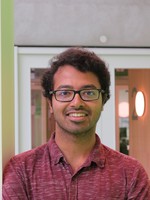dr. Avishek Das

CV / Biography
– What makes a collection of chemical reactions into a living organism?
– How do biological cells perceive and manipulate their noisy world?
– How does chemistry and diffusion come together to create intelligent spatiotemporal patterns?
These are the core questions that fuel my research in the information processing of soft and biological matter. I strive to answer these through fundamental theory in statistical physics and information theory, through the development of novel numerical algorithms, and by collaboration with experiments for characterizing and designing intelligent matter.
Currently in my postdoctoral research in the group of Prof. Pieter Rein ten Wolde at AMOLF, I am exploring the behavioral similarity between motile bacteria, and synthetic microrobots that would optimally climb up the gradient of a chemical signal. Using the framework of information theory, we are developing novel theoretical, numerical and experimental techniques to quantify the directional information processing in general biochemical networks, and specifically for stochastic navigators. As an end goal we ask: how exactly does information act as a currency in the design of an autonomous navigator? Do biological navigators optimally use their acquired information?
I did my PhD in Physical (Theoretical) Chemistry with Prof. David Limmer at the University of California Berkeley. There I designed a novel numerical paradigm, called Variational Path Sampling, for simulating and designing nonequilibrium fluctuations of soft matter. My research synthesized tools from molecular dynamics simulations, large deviation theory in probability, stochastic thermodynamics, and reinforcement learning. We produced several efficient numerical algorithms to sample rare fluctuations, infer reaction rate constants, design self-assembly and create life-life properties in colloids.
Besides these directions, I ponder a lot about the rare events that could have led to the origin of life on earth. Another favorite activity of mine is teaching. I have experience as a teaching assistant for several graduate-level physical chemistry courses. I like teaching so much that, after my teaching assistantship was over, I co-founded, designed and taught a yearly mathematics bootcamp for physical chemistry PhD students at Berkeley.
Research Interests
Information processing in soft matter, Biophysics of cellular motility, Nonequilibrium self-organization in colloids, Rare event sampling, Numerical algorithms for statistical physics


